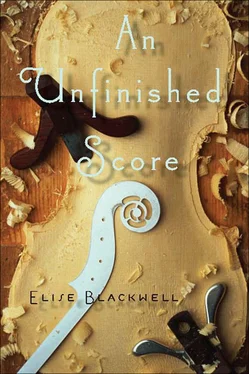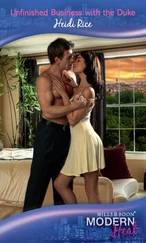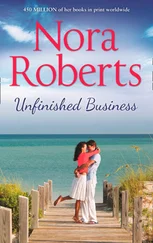After the move Ben was miserable, though he was kind enough to pretend they were happy when his mother phoned every other Sunday at three. Suzanne saw him shrivel, his sullenness giving way to something more self-destructive, living across the river in an Illinois suburb, despising all things Midwestern and hating her for taking him there. Her work was more intense than it had been in Charleston, of course, with a longer season, some travel, and frequent rehearsals.
Sometimes, looking back, she thinks they could have made it work. Ben could have tried harder to make friends and contacts in St. Louis. They could have moved across the river into the city after they realized the suburb was a mistake, after they realized they were not the kind of people who could live comfortably next door to people who do not listen to music. But when the symphony announced an ambitious tour schedule, Suzanne imagined Ben alone in their house, dying. A melodramatic vision, but she believed in it. Also, she told herself, the life they were making there would never accommodate children. So when Petra called, she figured it was for the best. Perhaps Ben’s mother was right about her: she’d always had a smart poor girl’s desperate desire to succeed and have the world notice.
Over time Suzanne heard in Ben’s remarks a disdain for the work that paid most of their bills. And she wondered if he heard in her sentences conformity, utilitarianism, a lack of the kind of imagination he equated with intelligence. Always she was too tired to debate the subjects that really interested him, the theories that sparked his fire. Once she started to tell him that she still thought about those ideas, but she didn’t get around to saying it. If she had, would their life have unfolded in a different, better shape? Or would he have heard only the accusation? Over time they talked of music less and less; like other couples they knew, they spoke of other people, of household lists and chores, of money in and money out.
Now, about twice a year Suzanne tries to bring up the future, to discuss what they will do when his trust fund runs out, if the quartet doesn’t make it, when her performance days are waning, at what point it will be too late to have a child. Even if the quartet succeeds, they aren’t many years away from using only soft-light photos on their CD covers — if CDs survive or classical musicians figure out a way to profit from downloads. And if they make it more than a few years, then there will be no photos at all. What will happen the day Anthony tells Suzanne and Petra to pin their hair up?
Suzanne hopes that Kazuo will be able to help Ben into a teaching position more permanent than the occasional course he teaches at the Westminster Choir College. She considers it for herself sometimes as well. She could be happy teaching at Curtis; she knows this. She might even be willing to teach children for supplemental income, in order to have children of her own. She’d been willing to give up on children to lead an extraordinary life, but since Alex’s death, the pull has returned. It feels impossible, though, even without Olivia’s long shadow. When Suzanne wakes in the middle of the night, as she does every night, the fear that gnaws at her after she sorts through her quotidian worries is that her life will be a paltry version of ordinary. It will be unremarkable yet lacking the common rewards of living like everyone else.
And then comes the deeper, colder fear, the one that stops her from telling the truth and starting over clean: that she will wind up alone, her only solace being able to play, rather well, music written by people who are dead.
As his premiere nears, Ben rises even earlier, and Suzanne stays up late. Unable to practice in a sleeping household, she uses the late caffeinated hours to study Alex’s score. Using an electronic keyboard and earphones, she begins to sketch ideas for its arrangement. But the concerto is an unfinished composition, and she knows that she cannot finish the work without coming to a deeper understanding of its nature — an understanding profound enough to complete it on its own terms. At moments she feels as though she is inhabiting Alex’s very soul, and it is a place more foreign than any country she has ever stood in.
Her days go to practice, both alone and with the quartet as they prepare the Black Angels for performance. There are key problems to solve, most pertaining to amplification. All four musicians listen to what the music tells them to do, and their answers are remarkably similar. Perhaps this is why, despite their personality differences, they formed an ensemble.
They will not use an electric violin. They will amplify more than was possible when Crumb wrote the music but not as loud as is possible now. They will use bold physical gesture in addition to sound to create the necessary triple fortissimo. They will rosin heavily to play the ponticello right on their bridges without falling off. They hire a mixer — a young man Kazuo recommends — to ride the levels so that the nuances they have discovered while taking the music apart bar by bar will not be lost. They will highlight Crumb’s superstitious numerology: the trinity of three, the holiness of seven, the devil of thirteen. When it is suggested that Daniel be the one to cue, he says, “I don’t cue. That’s why I picked the cello.” But he is joking; he will cue the opening.
All four musicians agree that the Black Angels will be the concert centerpiece and will follow intermission. Everyone but Anthony wants to begin the program with the only quartet Ravel ever wrote. Rejected by the Prix de Rome and the Conservatoire de Paris, the music was criticized by none other than Gabriel Fauré, the man to whom it was dedicated. Fauré declared the final movement to be stunted, poorly balanced, a failure. Ravel himself viewed it as imperfectly realized but a great step forward. Frustrated, he left the Conservatoire in what proved to be a good move. The listening public soon embraced him, and Debussy wrote to him, “In the name of the gods of music and in my own, do not touch a single note you have written in your Quartet.”
“Debussy was right,” Petra declares. “It’s imperfectly perfect.”
They sit on the green outside Richardson Auditorium, each cross-legged except for Anthony, who sits with his legs in front of him, knees just a little bent. There are clouds, moving slowly, obscuring and then revealing the sun. Suzanne likes the warmth on her face but is relieved when a cloud takes it away and again pleased when it is returned.
Anthony argues for Haydn’s String Quartet in G major. “It does contain some real surprises, particularly that ending. It’s a good setup.”
Suzanne looks around at the other three. “Maybe Anthony is right. We could pitch it as a history bookends kind of thing — an early quartet and a late one.”
A black squirrel chases a gray one as she speaks.
Daniel’s expression is muddy. “That’s strange, isn’t it? I thought places were supposed to have either black squirrels or gray ones, not both.”
Petra cocks her head. “Let me get this straight. Suzanne is advocating that we play Haydn? You’ve got your eye on the checkbook, too? Counting people in seats?”
“Let’s just say I’ve been reconsidering a few things. Anyway, it’s not like Ravel is some risky statement. Who doesn’t like Ravel?”
Petra shakes her head. “People say they like Ravel. Really they like Haydn and Vivaldi. People should like Ravel, and we should make them.”
“People,” Suzanne whispers. “Who is that, anyway? And how can you make them like something they don’t just by playing it? They either won’t come, or they’ll come and won’t like it, though they may, as you say, say they do.”
Читать дальше












